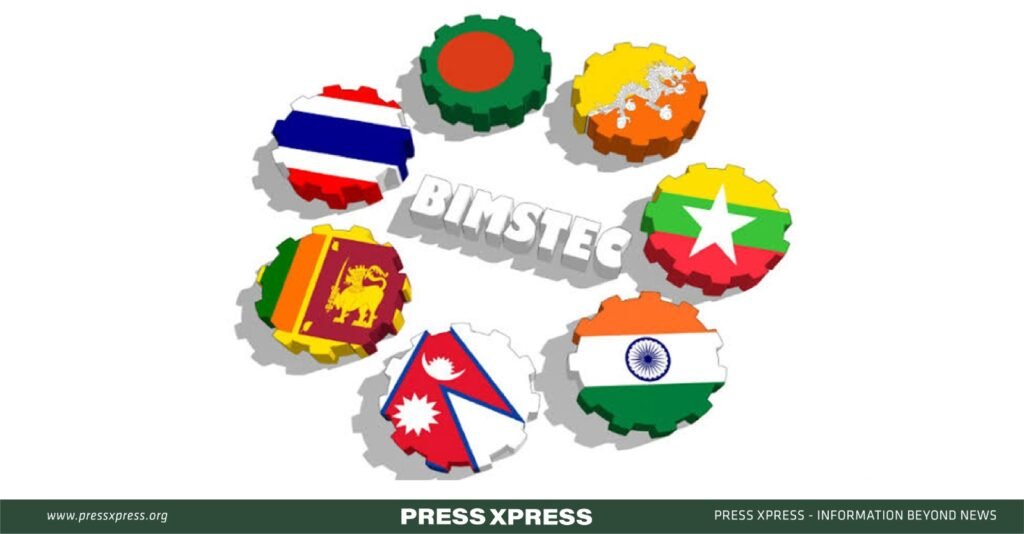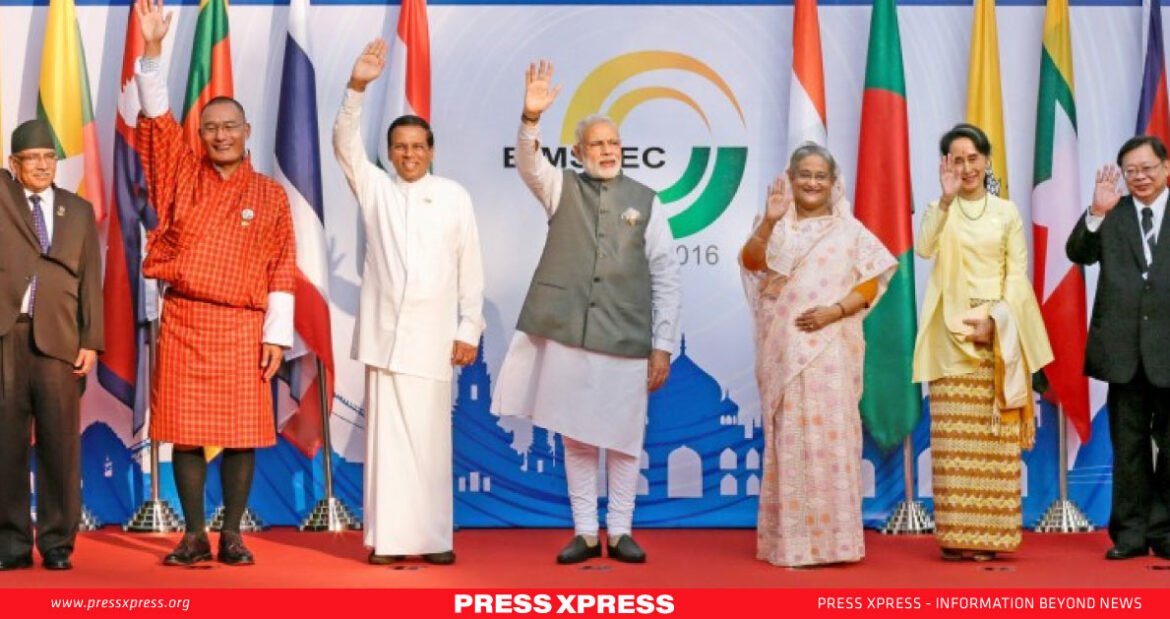The 6th BIMSTEC summit, set for September in Bangkok, marks a crucial juncture as global dynamics evolve and new challenges emerge. BIMSTEC, encompassing Bangladesh, Bhutan, India, Myanmar, Nepal, Sri Lanka, and Thailand, must adopt a fresh approach to regional cooperation amidst these shifting dimensions.
The concept of the New World Order signifies a geopolitical landscape in flux, characterized by evolving power structures, rapid technological progress, and heightened interconnectedness. In this context, global issues have grown more intricate and interdependent.
You Can Also Read: CAN BANGLADESH DRAW PROPER OUTPUT FROM BIMSTEC?
Despite prioritizing trade, BIMSTEC has yet to make significant strides in boosting trade among its South and Southeast Asian member states. Since its inception in 1997, the bloc has struggled to streamline tariff and non-tariff measures (NTMs), regulatory frameworks, and harmonize standards, as highlighted in the Third Gulf Declaration. The Bengal Economic Dialogue 2024 concluded on 12 July in Bangkok.
Harnessing Opportunities Amidst Challenges
Maintaining peace and stability in an increasingly multipolar world stands as an urgent imperative. Challenges such as conflicts, terrorism, and cyber threats transcend national boundaries, necessitating collaborative international efforts.
Furthermore, advancements in artificial intelligence, biotechnology, and digital infrastructure present vast opportunities alongside ethical, security, and regulatory challenges. Addressing climate change, biodiversity conservation, and sustainable development necessitates concerted global action. Rising sea levels, extreme weather events, and resource scarcity affect nations across the BIMSTEC region and beyond.
In spite of progress, poverty persists in many BIMSTEC regions. Bridging economic disparities and achieving inclusive growth are crucial not only for regional prosperity but also for global stability. Moreover, several BIMSTEC nations grapple with macroeconomic instability, hindering poverty alleviation and resilience-building efforts.
Uniting Against Threats
BIMSTEC, the Bay of Bengal Initiative for Multi-Sectoral Technical and Economic Cooperation, stands as a pivotal regional platform aimed at bolstering economic ties, reducing poverty, and fostering sustainable development across its member states. Emphasizing trade, investment, connectivity, and cooperation, BIMSTEC focuses on enhancing regional integration through collaborative efforts.
Recognizing the pervasive threats of terrorism and transnational organized crime, BIMSTEC underscores the importance of joint initiatives and information sharing among its member nations. This collective approach is pivotal in safeguarding regional stability and security.
Connectivity lies at the heart of BIMSTEC’s agenda, spanning physical infrastructure, digital networks, and people-to-people ties. By bolstering transport links, energy networks, digital infrastructure, and technological cooperation, BIMSTEC endeavors to catalyze economic growth and bolster resilience within the region.
Many BIMSTEC countries face significant climate vulnerabilities, with some experiencing acute challenges such as rising sea levels and extreme weather events. Collaborative efforts within BIMSTEC are crucial in addressing climate change mitigation, disaster risk reduction, and sustainable resource management across the region.

Challenges and Imperatives for Deeper Integration
Despite these aspirations and its nearly three-decade existence, BIMSTEC’s journey towards deeper regional integration has been marred by persistent challenges. One critical impediment is the uneven political commitment among member state leaders. Larger countries have at times failed to consistently prioritize BIMSTEC, impacting the organization’s momentum and agenda advancement. Conversely, smaller nations have also faced challenges in elevating BIMSTEC’s status on their national priorities, as evidenced by the prolonged process—25 years—to formalize a Charter, delaying institutionalization and decision-making processes.
Furthermore, the translation of commitments into tangible actions requires sustained efforts and effective project implementation. BIMSTEC must prioritize the execution of projects and rigorously monitor outcomes to ensure meaningful progress. Developing a cohesive security framework is equally imperative to address shared security challenges effectively.
As BIMSTEC navigates these complexities, the organization’s future hinges on collective resolve, enhanced political commitment, and proactive steps to translate aspirations into concrete results. The forthcoming initiatives must prioritize cohesion, collaboration, and pragmatic actions to propel BIMSTEC towards its overarching goals of regional prosperity and resilience in a dynamic global landscape.
Addressing non-traditional security threats, such as cyber threats and climate-induced migration, is imperative for BIMSTEC to ensure regional stability and resilience. Adopting a holistic approach that engages civil society, academia, and the private sector is essential in tackling these multifaceted challenges. Moreover, gender mainstreaming and youth involvement are crucial for fostering inclusive and sustainable development across the region.
Enhancing trade facilitation, reducing non-tariff barriers, and promoting investment are pivotal steps towards bolstering economic integration within BIMSTEC. Despite progress in physical connectivity and trade volumes, intra-regional trade remains disproportionately low at approximately 7%, significantly trailing behind ASEAN’s 25%.
The Dilemma of the BIMSTEC Secretariat
The region faces a substantial infrastructure investment gap estimated at around $120 billion annually, which poses a significant hurdle to seamless economic collaboration and integration.
Despite the signing of a framework agreement in 2004, BIMSTEC has yet to achieve a comprehensive Free Trade Agreement (FTA). Fragmented trade arrangements persist as member countries have pursued multiple bilateral and multilateral trade agreements with other nations.
However, skepticism surrounding the BIMSTEC FTA among larger member states has cast doubts on its progress. Historical disputes over sensitive trade issues, reluctance to liberalize economies, and non-tariff barriers have further impeded the realization of an FTA.
Bilateral tensions between member states, exemplified by issues between Bangladesh and Myanmar, also undercut BIMSTEC’s cohesion and effectiveness. Additionally, preferences for ASEAN over BIMSTEC among some member states, like Thailand and Myanmar, due to ASEAN’s more advanced integration framework, pose additional challenges.
Financial constraints severely limit the BIMSTEC Secretariat’s operational capacity. Inadequate funding hampers its ability to implement projects, organize events, and facilitate cooperation effectively among member countries. Moreover, a shortage of skilled personnel further impedes the Secretariat’s overall efficiency and effectiveness.
Insufficient resources also undermine the Secretariat’s visibility and influence on both regional and global stages. Limited advocacy efforts, outreach activities, and communication strategies diminish its ability to effectively promote and advance BIMSTEC’s objectives.
Potential Initiatives for Strengthening BIMSTEC:
- Educating youth about BIMSTEC’s significance
- Investing in cross-border infrastructure
- Enhancing digital connectivity to foster stronger regional ties
To address these challenges, initiatives such as educating youth about BIMSTEC’s significance, investing in cross-border infrastructure, and enhancing digital connectivity are crucial steps towards fostering stronger regional ties. By promoting mutual understanding and trust, BIMSTEC can significantly enhance regional cooperation.
In conclusion, BIMSTEC, as a pivotal regional entity, holds immense potential to shape the evolving global order. Through fostering cooperation, building resilience, and advancing sustainable development across the Bay of Bengal region, BIMSTEC can make substantial contributions to global progress. Its effectiveness hinges on collective commitment, pragmatic initiatives, and adaptability to the dynamic challenges of our times.


